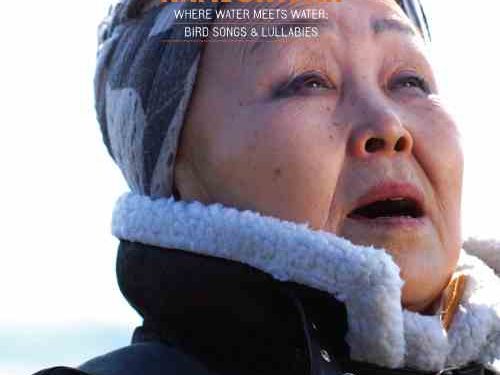-
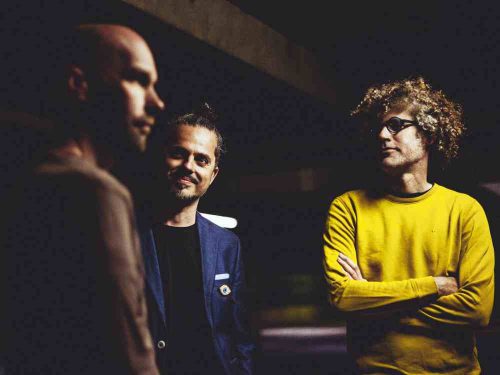 Back in 2019, we were introduced to Bâton Bleu's Weird and Wonderful Tales and their "hybrid of styles from France, Louisiana, Mongolia, and elsewhere” as David Cox wrote in his review. The France based duo of Maria Laurent and Gautier Degandt, and their quirky songs in French and English, were enchanting and sometimes disorienting. As we approach the end of 2023, Gautier Degandt returns with a new ensemble, with all the quirkiness, and a harder edge. En Gramma ("the trace that memory left”) is a trio of Degandt on lead voice, and kalimba here and there, with Oscar Philéas on guitars and chorus, and Pierre-Yves Dubois on percussion, chorus and occasional violin. Beau Brûlis (Burnt Beauty) is an adventure, a complex mixture of subtly, rawness and humor. It leans heavily on blues guitar structures, but I'll not call it blues, or rock. They call it 'trance rock,' but I am not sure if I am so much mesmerized as simply fascinated. - Cliff Furnald in RootsWorld
Back in 2019, we were introduced to Bâton Bleu's Weird and Wonderful Tales and their "hybrid of styles from France, Louisiana, Mongolia, and elsewhere” as David Cox wrote in his review. The France based duo of Maria Laurent and Gautier Degandt, and their quirky songs in French and English, were enchanting and sometimes disorienting. As we approach the end of 2023, Gautier Degandt returns with a new ensemble, with all the quirkiness, and a harder edge. En Gramma ("the trace that memory left”) is a trio of Degandt on lead voice, and kalimba here and there, with Oscar Philéas on guitars and chorus, and Pierre-Yves Dubois on percussion, chorus and occasional violin. Beau Brûlis (Burnt Beauty) is an adventure, a complex mixture of subtly, rawness and humor. It leans heavily on blues guitar structures, but I'll not call it blues, or rock. They call it 'trance rock,' but I am not sure if I am so much mesmerized as simply fascinated. - Cliff Furnald in RootsWorld -
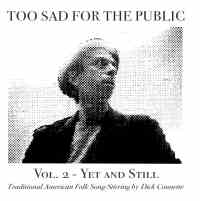 In his lovely, soulful second album as the collaborative Too Sad for the Public, composer Dick Connette reverently and sometimes irreverently takes the roughhewn spirit of American folk music and refines it like a hunk of whale bone etched into an elaborate, beautiful scrimshaw. Over the years, Connette has irregularly skimmed across the music-industry firmament like a comet, as a producer of others and then with his ensemble Last Forever, where he carefully designed his exquisitely wrought chamber-folk songs and assembled talented musicians to perform them.... On his latest, Too Sad for the Public: Vol. 2: Yet and Still, Connette mostly turns to Canadian-born and Brooklyn-based Ana Egge as the vocal focus of the songs with lyrics. Her bluesy drawl – reminiscent of the laidback, late-night, jazz-hipster singing of Rickie Lee Jones - gives the songs a sardonic, wry sensibility. On “G. Burns in the Bottom,” which takes off from an old string-band song, Egge sings with the darkest of humor: “It’s the awful truth in a world of hurt; Nobody’s smarter than the dirt.” Though known as a musical composer, Connette also shines as a lyricist. His sung stories have the resonance of folk wisdom, but he seasons his wisdom with wry touches of absurdist wit. “I can tell time but I can’t tell it much,” says one narrator. Connette is able to evoke the struggles of his hapless townspeople while still leavening it with a deadpan sense of humor. - Marty Lipp in RootsWorld Magazine
In his lovely, soulful second album as the collaborative Too Sad for the Public, composer Dick Connette reverently and sometimes irreverently takes the roughhewn spirit of American folk music and refines it like a hunk of whale bone etched into an elaborate, beautiful scrimshaw. Over the years, Connette has irregularly skimmed across the music-industry firmament like a comet, as a producer of others and then with his ensemble Last Forever, where he carefully designed his exquisitely wrought chamber-folk songs and assembled talented musicians to perform them.... On his latest, Too Sad for the Public: Vol. 2: Yet and Still, Connette mostly turns to Canadian-born and Brooklyn-based Ana Egge as the vocal focus of the songs with lyrics. Her bluesy drawl – reminiscent of the laidback, late-night, jazz-hipster singing of Rickie Lee Jones - gives the songs a sardonic, wry sensibility. On “G. Burns in the Bottom,” which takes off from an old string-band song, Egge sings with the darkest of humor: “It’s the awful truth in a world of hurt; Nobody’s smarter than the dirt.” Though known as a musical composer, Connette also shines as a lyricist. His sung stories have the resonance of folk wisdom, but he seasons his wisdom with wry touches of absurdist wit. “I can tell time but I can’t tell it much,” says one narrator. Connette is able to evoke the struggles of his hapless townspeople while still leavening it with a deadpan sense of humor. - Marty Lipp in RootsWorld Magazine -
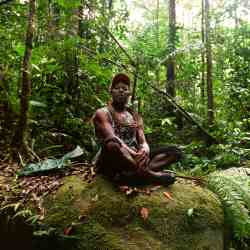 Polobi and the Gwo Ka Masters’ Abri Cyclonique is largely the production work of Irish-Parisian producer Doctor L – aka Liam Farrell. This record doesn’t sound anything like traditional Gwoka drumming and singing, which is what 69 year old Creole singer and drummer Moise Polobi, from Petit-Bourg, Guadeloupe, became obsessed with as a boy. Eventually, he became a master of toumblak, a prominent Gwoka rhythm; he also joined drum, vocal, and dance troupe Indestwas Ka, who have recorded multiple albums and toured France and Canada. Musically, Gwoka demonstrates one more infectious, celebratory example of African musical tradition in the Caribbean.
Polobi and the Gwo Ka Masters’ Abri Cyclonique is largely the production work of Irish-Parisian producer Doctor L – aka Liam Farrell. This record doesn’t sound anything like traditional Gwoka drumming and singing, which is what 69 year old Creole singer and drummer Moise Polobi, from Petit-Bourg, Guadeloupe, became obsessed with as a boy. Eventually, he became a master of toumblak, a prominent Gwoka rhythm; he also joined drum, vocal, and dance troupe Indestwas Ka, who have recorded multiple albums and toured France and Canada. Musically, Gwoka demonstrates one more infectious, celebratory example of African musical tradition in the Caribbean. -
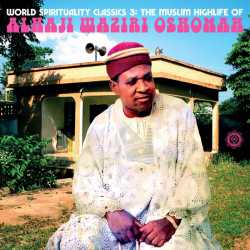 The music on this collection- recorded during the 1970s and early 1980s, arguably Nigeria’s most musically fertile and innovative period- is highlife getting a much needed makeover. Like the bigger names from eastern Igboland such as Celestine Ukwu, Chief Stephen Osita Osadebe, or Ali Chukwuma, Alhaji Waziri Oshomah and his bands de-emphasized the jazzy swing and large horn sections of highlife’s outdated past, and instead, brought local rhythms to the foreground, allowing electric guitars and keyboards to drive languorous, unhurried melodies for extended grooves. Luaka Bop’s latest in its 'World Spirituality Classics' series demonstrates Waziri’s leisurely approach with a collection of 7 songs anywhere from 8 to 17 minutes long.
The music on this collection- recorded during the 1970s and early 1980s, arguably Nigeria’s most musically fertile and innovative period- is highlife getting a much needed makeover. Like the bigger names from eastern Igboland such as Celestine Ukwu, Chief Stephen Osita Osadebe, or Ali Chukwuma, Alhaji Waziri Oshomah and his bands de-emphasized the jazzy swing and large horn sections of highlife’s outdated past, and instead, brought local rhythms to the foreground, allowing electric guitars and keyboards to drive languorous, unhurried melodies for extended grooves. Luaka Bop’s latest in its 'World Spirituality Classics' series demonstrates Waziri’s leisurely approach with a collection of 7 songs anywhere from 8 to 17 minutes long. -
 "With advanced degrees in musical performance and voice, and captured by the culture, spirituality and music of Candomblé, Bahia-born Irma Ferreira began a profound investigation of her Afro-Brazilian roots... (her) first solo album release, Ém Cantos de Orisá, bears the fruit of her investigation, borrowing both chants and melodies from Candomblé’s trove of devotional works. The chants have a more liturgical sound, while the songs suggest more secular themes. Pronounced percussion, typically expressive of the the more bellicose orisás, such as Sango, the spirit of thunder and lightning, and Ogúm, the warrior lord of iron and steel, yields to a more melody driven sound in Ferreira’s interpretations. The instrumentation, a blend of Western and Afro Brazilian, provides a felicitous, understated backdrop for her vocals." - RootsWorld
"With advanced degrees in musical performance and voice, and captured by the culture, spirituality and music of Candomblé, Bahia-born Irma Ferreira began a profound investigation of her Afro-Brazilian roots... (her) first solo album release, Ém Cantos de Orisá, bears the fruit of her investigation, borrowing both chants and melodies from Candomblé’s trove of devotional works. The chants have a more liturgical sound, while the songs suggest more secular themes. Pronounced percussion, typically expressive of the the more bellicose orisás, such as Sango, the spirit of thunder and lightning, and Ogúm, the warrior lord of iron and steel, yields to a more melody driven sound in Ferreira’s interpretations. The instrumentation, a blend of Western and Afro Brazilian, provides a felicitous, understated backdrop for her vocals." - RootsWorld -
 Aire posts Magos Herrera at the summit of her creativity and her agency. For the first time she holds the reins of vocalist, lyricist, composer, co-arranger, and executive producer, even artistic director, crafting, with an impressive supporting cast, a work all her own. Among the A-list players to join her are: Jacques Morelenbaum; Gonzalo Grau; Diego Schissi; Dori Caymmi; and her frequent collaborators, the Knights... Aire is a wide-ranging album musically, serving especially well Herrera’s luxuriant voice. And it is a thoughtful and thought-provoking work, a ballet of sound that closes the gap between elegance and feeling. - Carolina Amoruso in RootsWorld Magazine
Aire posts Magos Herrera at the summit of her creativity and her agency. For the first time she holds the reins of vocalist, lyricist, composer, co-arranger, and executive producer, even artistic director, crafting, with an impressive supporting cast, a work all her own. Among the A-list players to join her are: Jacques Morelenbaum; Gonzalo Grau; Diego Schissi; Dori Caymmi; and her frequent collaborators, the Knights... Aire is a wide-ranging album musically, serving especially well Herrera’s luxuriant voice. And it is a thoughtful and thought-provoking work, a ballet of sound that closes the gap between elegance and feeling. - Carolina Amoruso in RootsWorld Magazine -
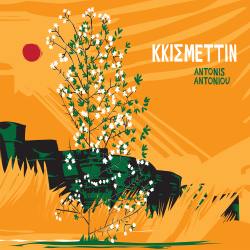 He has brought a modern political and aesthetic sense to the music of his home- Cyprus. Kkismettin (fate- destiny- kismet) was made during the pandemic lockdown we have all lived with- and Antonis took this as an opportunity to create new songs that could speak in various ways about that loss of freedom- and its parallels in the rest of our lives.
He has brought a modern political and aesthetic sense to the music of his home- Cyprus. Kkismettin (fate- destiny- kismet) was made during the pandemic lockdown we have all lived with- and Antonis took this as an opportunity to create new songs that could speak in various ways about that loss of freedom- and its parallels in the rest of our lives.


